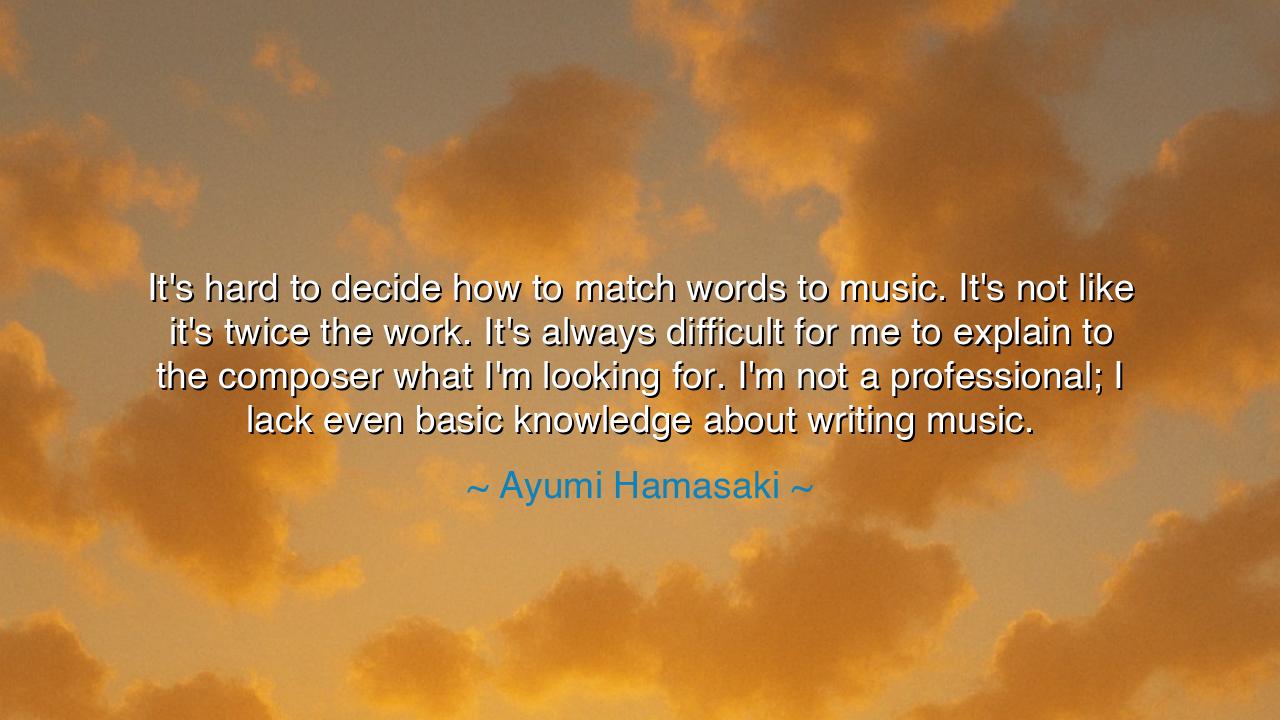
It's hard to decide how to match words to music. It's not like
It's hard to decide how to match words to music. It's not like it's twice the work. It's always difficult for me to explain to the composer what I'm looking for. I'm not a professional; I lack even basic knowledge about writing music.






The words of Ayumi Hamasaki, the “Empress of J-Pop,” carry a quiet humility that conceals a deep artistic truth: “It’s hard to decide how to match words to music. It’s not like it’s twice the work. It’s always difficult for me to explain to the composer what I’m looking for. I’m not a professional; I lack even basic knowledge about writing music.” Though she speaks with modesty, her confession reveals the eternal struggle of all creators—the challenge of bringing feeling into form, of translating the invisible fire of emotion into the language of sound and word. Beneath her tone of uncertainty lies something universal: the courage of the artist who stands before the mystery of creation, knowing she is unworthy of it, and yet dares to create.
To understand the origin of this thought, we must remember who Ayumi Hamasaki is. Rising from a world of glamour, hardship, and relentless pressure, she became not just a singer, but a cultural icon—an artist whose lyrics spoke directly to the hearts of millions. Yet despite her fame, she never claimed mastery over her art. Her quote comes from interviews where she reflected upon the creative process—the delicate balance between words and music, between her poetic heart and the technical craft of composition. In those moments, she revealed a truth that even the ancients understood: that art is not born from perfection, but from struggle and sincerity. It is not the skill of the hands, but the yearning of the soul, that gives life to beauty.
When she says, “It’s hard to decide how to match words to music,” she speaks of that sacred tension that every artist must face—the attempt to bridge the gap between emotion and expression. Words, by themselves, can soar with meaning; music, by itself, can move the heart without a single syllable. But when one tries to unite them, it is as though two powerful rivers meet—the current grows wild, unpredictable. The artist becomes both translator and alchemist, turning feelings into melody, and melody into emotion again. It is not double the work, as she says; it is a work of a different order, where intellect and instinct, logic and intuition, must dance together without colliding.
This difficulty is not unique to music. The great Michelangelo, when carving the statue of David, once said that the sculpture already existed within the marble; he merely had to free it. So too does Ayumi’s struggle mirror that of all creators—the effort to uncover what already lies hidden within the raw material of the soul. The composer, with his scales and measures, works from the outside in; the lyricist, with her feelings and words, works from the inside out. Their meeting is both miracle and labor. It is not the clash of ignorance and expertise, but the union of heart and craft, of passion and precision. And this union is never easy—it is the divine difficulty that gives art its power to move hearts across time.
Her humility—“I’m not a professional; I lack even basic knowledge about writing music”—is perhaps the most revealing line of all. In these words, we glimpse the paradox of true artistry: that greatness often walks hand in hand with doubt. The moment an artist believes she knows everything, her work loses its soul. It is the humble, the uncertain, the ever-seeking spirit who remains open to inspiration. Ayumi’s success was not born of technical mastery, but of honesty—of speaking what she felt even when she could not perfectly explain it. In that vulnerability lies her power, for art is not about knowing—it is about feeling. The ancient poet Sappho, too, wrote with such emotion that her fragments still tremble across millennia. She, like Ayumi, was not praised for her knowledge of form, but for the purity of her human truth.
The lesson of this quote is one that every soul—artist or otherwise—must learn: that imperfection is not a weakness in creation, but the doorway to authenticity. You do not need mastery to begin your work. You need sincerity. You do not need to speak the language of the experts; you need to speak the language of the heart. The world remembers not those who followed every rule, but those who revealed something of the human spirit. When Ayumi struggles to express what she means to her composers, it is not failure—it is proof that something real, something sacred, is stirring within her. For what can be easily explained is rarely profound.
Therefore, let this wisdom be passed down as a torch to those who create, and to those who live creatively: do not wait until you are perfect to begin. Begin in your weakness, and let your faithfulness refine you. Speak your truth even if your words are uncertain; sing even if your voice trembles. Trust that the act of doing—of creating, of expressing—will draw forth the knowledge you seek. As Ayumi herself teaches through her humility, practice refines skill, but devotion refines the soul.
And so, the words of Ayumi Hamasaki become a quiet hymn to all who labor in art and life. She reminds us that the divine harmony between words and music, between vision and reality, is not meant to be easy—it is meant to be transformative. The artist who embraces her limits finds in them her strength; the dreamer who struggles to express his vision draws nearer to truth. For it is not perfection that makes art eternal—it is the courage to reach for the inexpressible, to shape sound and silence into something that mirrors the beating heart of humanity itself.






AAdministratorAdministrator
Welcome, honored guests. Please leave a comment, we will respond soon